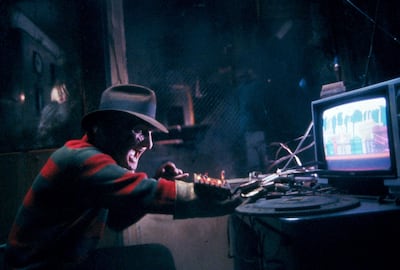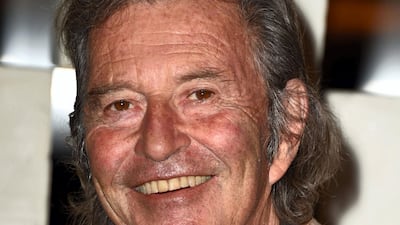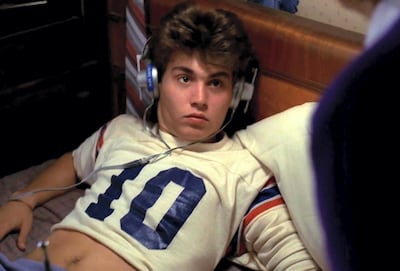"I'm going to talk about my career," says Robert Shaye when I ask the founder of New Line Cinema exactly what he plans to discuss in his coming masterclass in Abu Dhabi. "It's not that I have any particular objective insight into the movie business … but I would say that perhaps I could characterise my career as one that is hopeful for other people who want to get into it."
He is, of course, being modest. With 42 years in distribution and production, during which time New Line grew to become one of the most successful mini-majors of the era, Shaye knows more than his fair share about making it in movies. His studio's successes include Wes Craven's A Nightmare on Elm Street series, the Austin Powers trilogy and, more recently, Peter Jackson's The Lord of the Rings.
Alongside the masterclass, Craven's original 1984 film A Nightmare on Elm Street will be screened. Also being screened this week is a movie Shaye is very "fond" of – the Jim Carrey and Cameron Diaz comedy The Mask – and "out of deference to real commercial success", the final part of The Lord of the Rings, 2003's The Return of the King, which won 11 Oscars including Best Picture.
Shaye – who turned 80 this year and marked it by directing the low-budget horror movie Ambition – is as driven as he ever was. Born in Detroit, he studied business and law but set his heart on a career in the movies. Trouble is, he had no contacts in the industry, no real way in. "There has always been an antipathy for a guy who is a lawyer trying to make movies and distribute movies."
After graduating from Columbia University, he wrote to American International Pictures' chief executive, Sam Arkoff, asking if he could have an internship, but never received a reply. "That raised my egotistical hackles and I decided 'Screw that – I'm going to start my own company. I don't need to have anybody tell me what to do'. And I coined this little mantra myself: even though there are big and little companies, not one of them had the monopoly on creativity."

While New Line's early successes included playing to the college campus crowd with films like Reefer Madness and Sympathy for the Devil, and distributing early movies by "the pope of trash" John Waters and martial artist Sonny Chiba, it was Craven's slasher film A Nightmare on Elm Street that proved a major turning point. Introducing the world to the razor-clawed child killer Freddy Krueger – not to mention Johnny Depp, in his first screen role – it took $25 million (Dh91.8m) in the US alone.
Shaye says Craven wouldn't meet New Line initially. "When we were not part of the establishment it was like being from a different country, almost. Nobody wanted a business school graduate who wasn't playing by the rules coming in and reading their scripts. Wes was not such a big shot then either but he had, as they say in the industry, bigger fish to fry and it took me almost six months to get him to agree to send me the script."
Eventually he did and Shaye was hooked. "I thought it was an incredibly strong idea, mostly because it had a built-in marketing ploy which was unbeatable. Everybody in the whole world has nightmares. It wasn't a love story or a kung-fu story. It was about nightmares and how lucky we are to wake up from them, and what about a story where there were four kids who had the same nightmares and they started not waking up from them?" Elm Street became an enormous franchise – spawning sequels, a television series, a crossover with another Eighties slasher flick, Friday the 13th, and a remake. Until then, Shaye says, New Line had been "lurching from one production to another", typical of the film industry. "That's the nature of the business. It's not like you invent pork and beans and you can sell them for years on end. Film has a very finite life."
By the 1990s, acquired by Turner Broadcasting System, New Line was on a roll – whether it was crushing it with the Ice Cube-starring comedy Friday or courting maverick directors like David Fincher (Se7en), Paul Thomas Anderson (Boogie Nights, Magnolia) and Tony Kaye (American History X). For a while, Shaye's company became the home for outsider auteurs, a reflection of how he felt in the industry.
“Every one of these people … they’re not necessarily goodwill ambassadors,” he says. “They have their ego and their reputation to protect.” By comparison, Shaye seems level-headed. “I’m not one of those Las Vegas gambler moviemakers. I have stockholders and people I’m beholden to and a great team of colleagues, who I don’t want to sink the ship with because of my own creative ego. I’m very careful about these things.”
Even Lord of the Rings – three films made back to back – was no gamble, he says, with 80 per cent of the budget covered up front by international distributors. "The big risk was whether Peter could make the three films," he says. Only Jackson's The Frighteners and Heavenly Creatures had previously impressed Shaye, but he was taken by his pitch. "I try not to take a big risk with money, but I was willing to take reasonably big risks with talent."
Despite the success of Lord of the Rings, the company took a hit with The Golden Compass, the loss-making adaptation of Philip Pullman's first His Dark Materials novel. In 2008, now owned by Time Warner, New Line was shut as a separately operated company. "It sort of got away from us, and that was one of the reasons why New Line got downsized significantly," Shaye says. "Frankly, it had gotten out of control."

Shaye eventually left New Line and started Unique Features, which has produced Ambition – his third full-length work as director.
"Most people making films are highly sceptical of a so-called suit who he thinks he's a filmmaker. I explained to them I wasn't a suit, I was just a sports jacket!" A low-key thriller, Ambition brings him full circle, back to making cult cinema. "I'm just as happy with little films as mind-blowing big ones."
A Nightmare on Elm Street will be shown at Vox Cinemas, Nation Towers, Abu Dhabi, on Thursday, October 31. Doors open at 6pm, film from 7pm. Admission is free. The screening will be followed by a Q&A with Robert Shaye. Register at bobshaye.event@imagenation.ae


